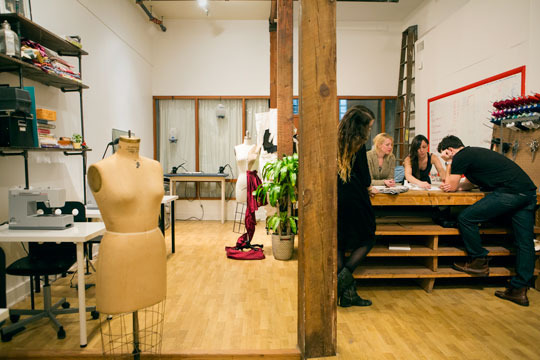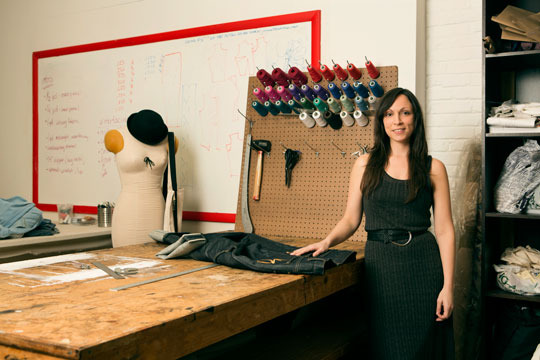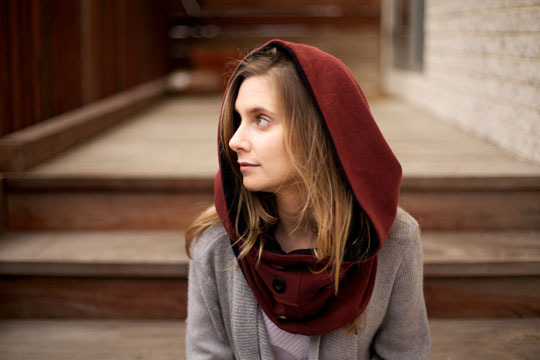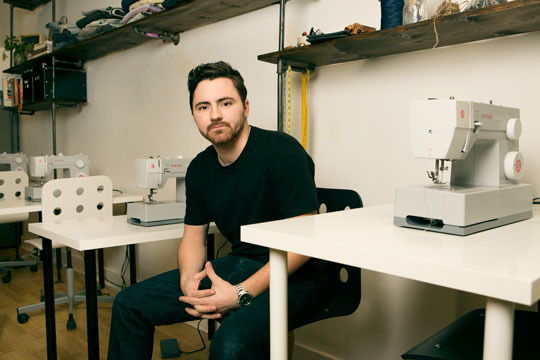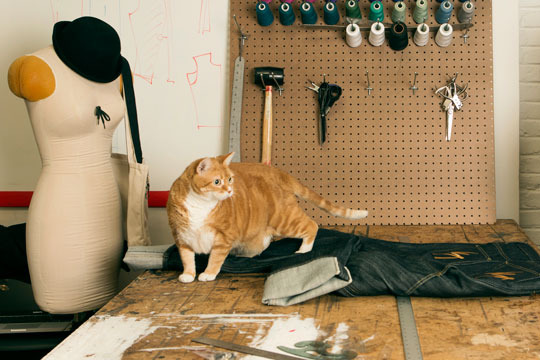The owner and self-described “mother hen” of it all is Rachel Ford, a 2004 Drexel University graduate who makes costumes for the Opera Company of Philadelphia. A devotee of draping, beading and all things couture, Ford also teaches Advanced Sewing and Fashion Design for Continuing Education at Moore College of Art. In 2006, she moved toward a career in costuming and education after an unfulfilling stint with Free People, one of the five brands in the Philadelphia-based Urban Outfitters retail empire.
At the Urban Outfitters company, Ford says, “My job was emailing China and India all day,” sourcing fabrics and negotiating production logistics. There was no time for actual designing—that had to happen at night, at home. “I paid my dues that way,” Ford says. But before long, she yearned to handcraft beautiful pieces again.
Ford found a job making costumes at the Arden Theatre, where she excelled in elaborate draping, beading and tailoring. Through her work there, she crossed paths with Richard St. Clair, costume director for the Opera Company of Philadelphia. St. Clair asked her to complete a difficult task: draping and sewing a gown in one day. Ford succeeded, and St. Clair hired her.
Funding for the arts in Philadelphia, however, is never a sure thing. When the Opera was forced to scale back, Ford and the other designers scrambled to find freelance work. She began hosting sewing classes in her Old City loft, taking on four Moore graduates who were looking to advance their dressmaking skills. The students showcased their work at the monthly art event First Friday, which grew so popular that the landlord became concerned about the amount of foot traffic.
“Something had to change,” Ford says. She began scouting buildings in the neighborhood and noticed a vacancy right across the street. Friends and family arrived to lug sewing machines, cutting tables and plumbing-pipe shelving into the high-ceilinged, white-walled space. MADE opened its doors in November 2013 at
305 Cherry Street, outfitted with 10 sewing stations, two large cutting tables, several dress forms, an eclectic mix of fabrics and threads, and one well-fed orange cat.
Although MADE’s classes were originally intended for more advanced designers, Ford has gradually introduced more foundational courses. Introductory Sewing, a six-week course of three-hour classes, provides instruction on stitching, finishing and basic sewing machine operation. From there, students can move through Intermediate and Advanced Sewing classes, then strengthen their creative muscles with Patternmaking, Tailoring and Draping/Evening Wear.
“Fashion intimidates, and that’s what I’m really trying to fight,” Ford says. “I wanted this to be a place with a sense of community, collaboration—not competition.”
And while the students are benefitting from study with highly skilled sewing teachers (many of Ford’s instructors are Opera colleagues) the teachers are benefitting from a fair wage.
“I believe in paying my teachers really well,” Ford says. “At the Opera, these people couldn’t find jobs. And they really are the best in the business.”
Ford’s dedication to supporting the workforce extends far beyond her own studio. She recently began teaching Burmese women in South Philadelphia to sew. The program, part of the Philadelphia Burmese Women’s initiative, was launched in 2013 by social worker Jessica Lee, with funds from the Women’s Way Turning Point Prize.
“We intended to just run a pilot sewing class with 25 women,” Lee says. “However, there was a great deal of interest, so we decided to start with two sections of class.” She adds that there are currently 43 Burmese women enrolled, and because of the popularity, a third section, also taught by Ford, will start in March.
“In the first class, there were 50 women and 24 machines,” Ford says. “Nobody speaks English, and they speak two different types of Burmese, so we had to have two translators. And I’m very conversational, so I had to learn to be really concise, and do a lot of demonstrating. But these women, they were immediately picking it up! I’m so beyond excited about what this could be.”
Ford, long a champion of local production, sees an inkling of hope in this program for a new manufacturing system. People, such as the Burmese women, who desperately need jobs but have limitations—language barriers, large families to care for and cultural mores that keep them in the home—could do piecework from home. Collars, cuffs and other pieces could be made separately, collected within the community and sewed together.
Is there a need here for such alternative production processes? Absolutely, according to Ford. “There are only three places to manufacture in Philly,” she says. “And they won’t take small designers’ work because it’s too expensive for them to do a small run.”
But what about all those art school graduates looking for work?
“Everybody wants to be a designer,” Ford says. “Nobody wants to sit here and sew.” She originally wanted to offer small production jobs to her students so they could earn a reasonable wage while practicing their skills. So when Avi Loren Fox came to MADE in 2013 looking for help producing her hood scarf, the JANEY, Ford jumped on board.
“Places like MADE make the dream possible for designers like me,” Fox says.
The JANEY project was right in line with Ford’s ideology. Fox wanted her garment to be made from natural, recycled cotton and cashmere sweaters collected from friends and thrift stores. She wanted beautiful, one-of-a-kind pieces that would be with the buyer for years. And she wanted to adhere to a triple-bottom-line model, which calls for increasing social good and maintaining environmental sustainability, while earning a profit.
“I think it’s important to put the type of energy out there that you want to receive back,” Fox says. She aspired to find local producers who would respect her ethics, but her company was too small for most manufacturers to take on as a client. Several different people pointed her to Ford, and when they met, Fox says, “I was so amazed at her immediate support.”
In keeping with the idea of a fair wage, Ford offered her students $15 per hour to produce the first run of JANEYS. And while several expressed interest, nobody showed up for the job. Ford rolled up her sleeves and went to work hand-cutting and sewing each piece herself. Less than three weeks later, 30 JANEYs were ready to find their homes.
Today, JANEYs are made by several small independent producers in Philadelphia. Labels are printed on eco-friendly cotton by a small studio in Massachusetts, and the hang tags and Fox’s business cards are printed on 100 percent recycled, made-in-America paper at Philadelphia’s Casa Papel. And Ford has learned her lesson about local manufacturing jobs.
“The hurdle is going to be people wanting those jobs,” she says. “We have to do it in a way that’s noninvasive, and pay people enough to want to have those jobs. American workers need to be paid a certain living wage, and that is twice minimum wage.”
She also thinks that “restoring a bit of cool factor” is a way to encourage people to return to a handcrafted mindset. “We’re very much back to an industrial revolution of sorts,” she says. Ford envisions a workshop that would facilitate learning and working—open space, natural light, collaborative energy.
And, she adds, “It’s got to be a shift in quality. Right now, we have this need to buy a new thing every two weeks, instead of buying life pieces. And it’s going to take designers spending more and making less product.”
Ford’s students are starting to see the light as well. Alicia Walker, a handbag designer, says there’s a future for fashion production in Philadelphia. “Philly has not only the space, but also the talent,” she says. “There are tons of budding designers right here in the city, as well as abroad, looking to avoid the overly saturated boundaries and expenses of New York.”
Deane Nanni—whose knitwear and unisex style caught Ford’s attention—started his fashion career hand-making pockets and sewing them onto shirts he bought on clearance at Marshalls, a national department store chain. Now he’s learning the techniques he needs to produce a full line.
“I made a button-down from scratch in Advanced Sewing, and when I finished, it was a surreal moment,” he says, adding that he hopes Philadelphians can find a way to start producing their own goods. “I would love to be able to advertise [that] my brand was made in my own city. It wouldn’t get much better than that.”
While Ford has big dreams for fashion in Philly, she’s pleased with what she’s created so far. Looking around MADE, she says, “I think the more people want to sew here, the more they don’t want to stop. I’m loving every day of it.”
Story by Molly O’Neill, photos by Dustin Fenstermacher.



